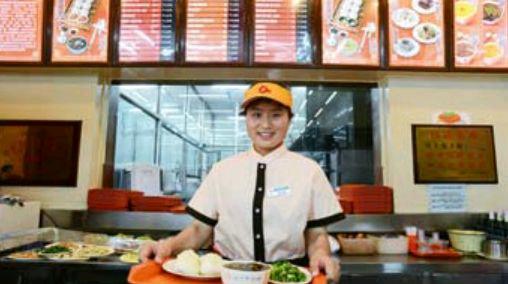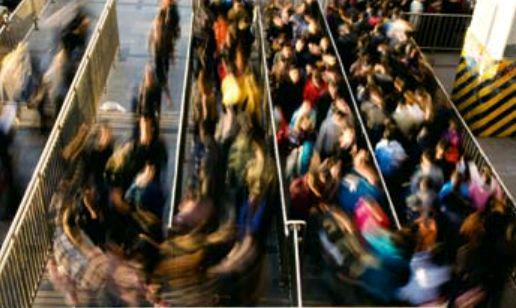Top 10 Chinese Buzzwords of 2014
Every year brings a new crop of buzzwords, and 2014 is no exception. Here are the 10 most popular buzzwords as determined by China Pictorial editorial staff. They are not just popular words and phrases, but cultural memes with rich context and implied emotion and attitude. Some reflect hot social issues, some indicate transformations or tendencies in Chinese society, and others convey common aspirations.
主席套餐?Presidents?Set?Meal
On December 28, 2013, Chinese President Xi Jinping ate lunch at the flagship Yuetan branch of Qingfeng Steamed Buns Restaurant in Beijing. His meal included six steamed buns filled with pork and green Chinese onion, a bowl of Beijing-style stirfried pork liver, and a small dish of pickled leaf mustard, for 21 yuan (US$ 3.5). The chain received a big bump in popularity, with that specific location attracting numerous diners from near and far, who came to make the same order and take photos at the table where the president sat. On December 29 alone, more than 400 ate at the restaurant.
打虎拍蝇?Hunt?Tigers?and?Swat?Flies
On December 5, 2014, the Political Bureau of the Central Committee of the Communist Party of China (CPC) voted to expel former member of the Standing Committee of the Political Bureau of the CPC Central Committee Zhou Yongkang from the Party and delivered evidence related to his suspected crimes to judicial authorities to be processed in accordance with the law. In 2014, the countrys anti-corruption efforts stepped up, targeting both “tigers”and “flies,” high and low-ranking corrupt officials, respectively.“Hunt tiger and swat flies” has become a popular phrase among Chinese people. By November 2014, the website of the CPC Central Commission for Discipline Inspection and the Ministry of Supervision had released names of hundreds of officials under investigation for corruption, including 40 at the ministerial level or higher.
单独两孩?“Two?Children”?Policy?
At the end of 2013, the Standing Committee of the National Peoples Congress, Chinas top legislative body, passed the Resolution on Adjusting and Improving the Family Planning Policy, allowing couples to have a second child if either parent is an only child. Since the beginning of 2014, most of Chinese provinces, municipalities and autonomous regions have formulated and enacted respective provisions on the implementation of the policy. It is a significant change to the countrys family planning policy that has been in place for decades. The National Health and Family Planning Commission of China predicted that 2 million additional newborns would be delivered each year due to the “two children”policy. However, statistics show that in the first eight months of 2014, only 700,000 of the 11 million qualified couples applied to have a second child, lower than expected.
父婴时代?Daddy-Baby?Time?
A 2014 survey shows that in 2013, 30 million fathers purchased paternal and baby products online and spent a total of 18.1 billion yuan. Though the figure was still far from the 29.1 billion yuan that maternal products brought in, 44 percent of related purchasers were fathers, a sharp rise over 32 percent the previous year. Greater numbers of fathers are getting involved in parenting and child-raising, heralding the dawn of “daddy-baby time.” It not only implies rising awareness of a fathers role in parenting, but also mirrors a change in the traditional domestic arrangement of“breadwinning men and homemaking women.”
政治副中心?Deputy?Political?Center
On February 26, 2014, Chinese President Xi Jinping called for integrated development of Beijing, Tianjin, and Hebei Province at a seminar in Beijing. As reported in Caijing magazine, Beijing, Tianjin, and Hebei have agreed to preliminarily make Hebeis Baoding City the first deputy political center of China. As planned, a group of public and educational institutions affiliated to ministries and commissions will be moved to the city. To date, the news remains unconfirmed officially.
BMW族?BMWer
BMW is an abbreviation for Bus/Bicycle, Metro and Walking. In metropolises like Beijing, many live far from their workplaces because of sky-high housing prices. Every day, they take a bus or bicycle just to reach the nearest metro station. After taking the subway, they walk another ten to twenty minutes to finally reach their destination. Commuters spending considerable time and energy on such long 3-legged journeys are nicknamed “BMWer”, and the tally keeps growing.
冰桶挑战?Ice?Bucket?Challenge
A campaign aiming to promote awareness of amyotrophic lateral sclerosis (ALS) disease and encourage donations to research efforts, the Ice Bucket Challenge landed in China in mid-August 2014. Within the weeks that followed, tremendous numbers of IT tycoons, celebrities, and regular folks dumped ice water on themselves, recorded the experience, and uploaded it – all to raise money to fight ALS. China-Dolls Center for Rare Diseases received donations of nearly 10 million yuan in two weeks, a figure five times the total of the donations it received in 2013.
暖男?Sunshine?Man?
The term “sunshine man” refers to a family man who can do housework and more importantly, is considerate and caring for his wifes feelings. A sunshine man has become a factor in Mr. Right for many females, especially those concentrating on careers. With increasing financial independence, Chinese women dont care as much about a mans ability to bring home the beacon, opting for better emotional qualities when choosing spouses.
橙领?Orange-Collar??
The term “orange-collar” derives from the major color of Chinas largest online shopping website, Taobao.com, and now more generally refers to anyone employed in e-commerce. Many orange-collar workers are tasked with writing blogs or posting in forums to lure potential shoppers. They first pinpoint customerstrending needs, then determine which products will sell well by analyzing data, and finally write a promotional blog and communicate directly with customers. The popularity of the term mirrors the rapid growth of e-commerce in China.
APEC蓝?APEC?Blue??
“APEC blue” is a trending phrase coined by Chinese netizens to describe rare blue skies during the smoggiest season in heavily-polluted Beijing, which just happened to occur when the city hosted the 2014 Asia-Pacific Economic Cooperation (APEC) Economic Leaders Week. Some believe that it was partially thanks to tough emissions-reduction measures, such as suspending factory production and cutting in half motor vehicles on roads. Chinese people hope APEC blue eventually becomes the “new normal.”
China Pictorial2015年1期
